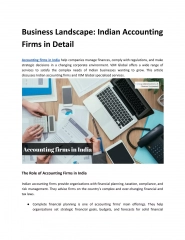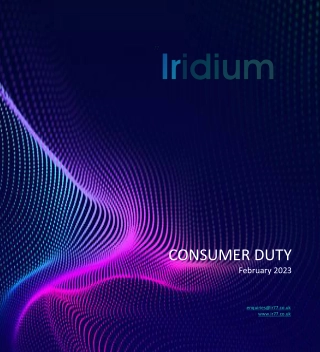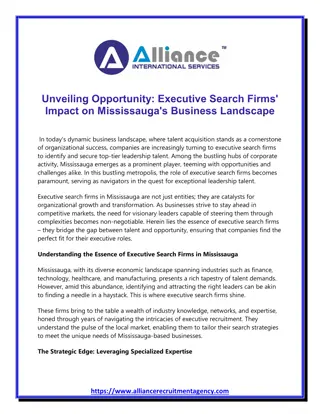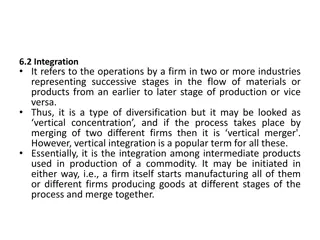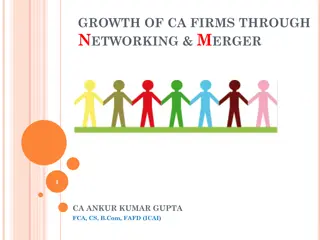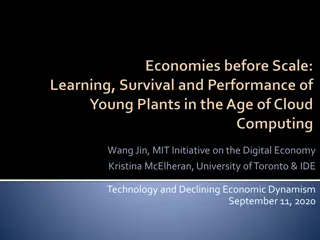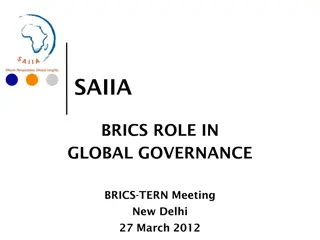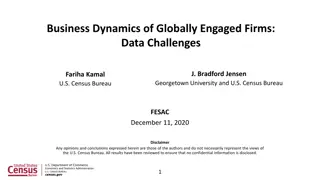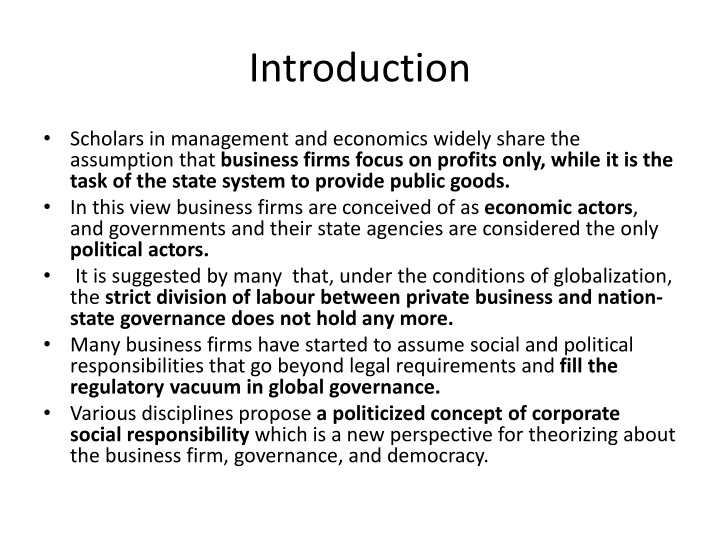
Evolving Role of Business Firms in Global Governance
Scholars suggest a politicized concept of corporate social responsibility, positioning business firms as active contributors in global governance alongside governments and civil society organizations. This shift beyond profit focus entails engaging in public goods provision, addressing social issues, and promoting ethical and environmental practices, reflecting a new model of political CSR shaping modern economic landscapes.
Download Presentation

Please find below an Image/Link to download the presentation.
The content on the website is provided AS IS for your information and personal use only. It may not be sold, licensed, or shared on other websites without obtaining consent from the author. If you encounter any issues during the download, it is possible that the publisher has removed the file from their server.
You are allowed to download the files provided on this website for personal or commercial use, subject to the condition that they are used lawfully. All files are the property of their respective owners.
The content on the website is provided AS IS for your information and personal use only. It may not be sold, licensed, or shared on other websites without obtaining consent from the author.
E N D
Presentation Transcript
Introduction Scholars in management and economics widely share the assumption that business firms focus on profits only, while it is the task of the state system to provide public goods. In this view business firms are conceived of as economic actors, and governments and their state agencies are considered the only political actors. It is suggested by many that, under the conditions of globalization, the strict division of labour between private business and nation- state governance does not hold any more. Many business firms have started to assume social and political responsibilities that go beyond legal requirements and fill the regulatory vacuum in global governance. Various disciplines propose a politicized concept of corporate social responsibility which is a new perspective for theorizing about the business firm, governance, and democracy.
Social and Political Responsibilities of Business Firms During the past decades business firms have started to engage in activities that have traditionally been regarded as actual governmental activities. This is especially true for multinational corporations (MNCs). They engage in public health, education, social security, and protection of human rights while often operating in countries with failed state agencies. They address social ills such as AIDS, malnutrition, homelessness, and illiteracy; define ethics codes; protect the natural environment; engage in self- regulation to fill global gaps in legal regulation and moral orientation; and promote societal peace and stability.
Global Governance: A Polycentric and Multilateral Process On the global level, neither nation-states nor international institutions alone are able to sufficiently regulate the global economy and to provide global public goods. Rather, global governance, seen as the process of defining and implementing global rules and providing global public goods, is a polycentric and multilateral process to which governments, international institutions, civil society groups, and business firms contribute knowledge and resources . Unlike national governance with its monopoly on the use of force and the capacity to enforce regulations upon private actors within the national territory, global governance rests on voluntary contributions and weak or even absent of enforcement mechanisms.
Political CSR Examining how recent debates in CSR reflect upon the consequences of globalization, a new perspective known as political CSR is proposed. In a nutshell, political CSR suggests an extended model of governance with business firms contributing to global regulation and providing public goods. It goes beyond the instrumental view on politics in order to develop a new understanding of global politics where private actors such as corporations and civil society organizations play an active role in the democratic regulation and control of market transactions. These insights may enrich the theory of the firm with a more balanced view on political and economic responsibilities in a globalized world.
The Global Institutional Context of CSR The changes in the underlying conceptual premises of CSR are explained with the help of five interrelated dimensions: governance model, role of law, scope of corporate responsibility, source of corporate legitimacy, and the role of democracy. The emerging global institutional context for CSR: From national to global governance. The post-national constellation is characterized by a loss of regulatory impact of national governments on MNCs. New societal risks result from this power shift and new forms of (global) governance have been developed to deal with those risks. CSR as self-regulation: From hard law to soft law. These new forms of governance do not only establish a new institutional context with private actors in a regulatory role, they also rely on a different form of regulation, the so-called soft law that operates without a governmental power to enforce rules and to sanction deviant behaviour (Shelton, 2000). As a consequence, self- regulation is becoming a key issue in the CSR debate (Cragg, 2005).
The Expanding Scope of CSR The expanding scope of CSR: From liability to social connectedness. The erosion of the national regulatory context becomes visible when corporations are criticized for abusing their growing power or for benefiting from their operations or those of their supply chain partners. Along their supply chains, MNCs are asked to take responsibility for more and more social and environmental externalities to which they are connected. The idea of social connectedness is replacing the idea of legal liability ( Young, 2008).
Changing Conditions of Corporate Legitimacy The changing conditions of corporate legitimacy: From cognitive and pragmatic legitimacy to moral legitimacy. Moral legitimacy, by contrast, is based on moral judgments and an exchange of arguments on whether an individual, an institution, or an action can be considered socially acceptable. CSR in a domestic context is building on the assumption that corporations, in order to preserve their legitimacy, follow the nationally defined rules of the game. In the changing institutional context of global governance, this stable framework of law and moral custom is eroding and corporations have to find new ways of keeping their licences to operate.
Changing Societal Foundations of CSR The changing societal foundation of CSR: From liberal democracy to deliberative democracy. The growing engagement of business firms in public policy leads to concerns of a democratic deficit. This assumption refers to the above analysed situation that national governments are partly losing their regulatory influence over globally stretched corporations while some of those corporations, under the pressure of civil society, start to regulate themselves. In other words, those who are democratically elected (governments) to regulate, have less power to do so, while those who start to get engaged in self-regulation (private corporations) have no democratic mandate for this engagement and cannot be held accountable by a civic polity. In democratic countries political authorities are elected periodically and are subjected to parliamentary control. By contrast, corporate managers are neither elected by the public, nor are their political interventions in global public policy sufficiently controlled by democratic institutions and procedures.
Deliberative Theory of Democracy: An Alternative Model It is, however, difficult to embed these profound changes of institutions, responsibilities, and legitimacy demands that follow the emerging post-national constellation within the received model of liberal democracy. From a liberal point of view, corporations are private, not political actors. Deliberative theory of democracy is discussed as an alternative model which seems to be better equipped to deal with the post-national constellation and to address the democratic deficit.
Corporations as Self-regulators In capitalist societies business firms are entitled to earn profits within the rules of the system but should not interfere in the political system itself (Friedman, 1962). But this claim is based on the assumption that corporations already operate in a stable and well ordered legal and moral framework. Globalization challenges this assumption and corporations do start to act as regulators themselves, when governmental regulation is not available or not enforced. However, it is unclear how and in what sense regulatory activities of private actors can be integrated into the established concept of democracy and how it could contribute to resolving the legitimacy problems of global governance (Cutler, 2001).
The Deliberative Model of Democracy The deliberative model of democracy is able to acknowledge the contribution of both state and non- state actors to global governance, both in the traditional institutionalized processes and in processes of public deliberation that emerge outside the traditional realm of institutionalized politics. A key assumption of the deliberative model of democracy is the idea that politics does not exclusively take place in the official governmental institutions but starts already at the level of deliberating civil society associations. Regulatory activities of governments should be connected to those processes of public will-formation (Habermas, 1996).
The Deliberative Model of Democracy and Democratic Legitimacy Democratic legitimacy in this alternative approach is created by a strengthened link between the decisions in the political institutions and the processes of public will-formation as driven by non-governmental organizations, civil movements, and other civil society actors who map, filter, amplify, bundle, and transmit private problems, values, and needs of the citizens (Habermas, 1996). The deliberative idea of strengthening the ties between political power and public deliberation builds upon the above described decentring of political governance and takes into consideration the changing dynamic between state, economy, and civil society. Corporations thereby become politicized in two ways: they operate with an enlarged understanding of responsibility; and help to solve political problems in cooperation with state actors and civil society actors. Furthermore, with their growing power and through their engagement in processes of self-regulation, they become subjects of new forms of democratic processes of control and legitimacy.
Argumentative Involvement of Citizens Liberal models of democracy lay emphasis on the beneficial outcomes of the political process. This manifests, for instance, in the concept of output legitimacy (Scharpf, 1999) in political science. Deliberative democracy, in turn, rather points at the argumentative involvement of the citizens in the decision-making processes themselves (Risse, 2004). Such an approach might be better equipped to conceptualize the growing relevance of private actors in global governance processes. It is necessary to understand and consider the rising tide of both conflict and cooperation between corporations and civil society activists as a key issue of the business and society debate.

